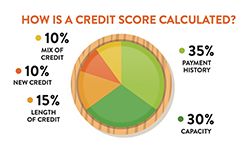It's that time. Your little girl or boy has grown up and is ready to chart their own course and leave the nest. Your child's choice to continue their education in pursuit of higher learning and a future career is exciting, but it's also a tough and important decision that can impact your child's financial future. Deciding what school to attend and what field of study to major in is daunting and costly in terms of both time and money. From textbooks and tuition to housing, the rising price of college raises financial concerns for both parents and students. What can you do to help your child have a healthy financial start towards their adult life?
We're sharing ways you can help prepare your child to manage college expenses like:

- Student loans: About 1 in 8 (12.9%) of people in the United States carry student loan debt and struggle to pay the debt off years later. The U.S. government and other financial institutions provide various types of student loans. Before your child takes out a student loan, make sure they understand the type of loan they have and the policies that come with it so they can make a plan to repay their loan before the amount becomes a financial burden.
- Housing: Housing can put a significant strain on your child's budget regardless of whether they live on or off-campus, especially with the rising cost of rent.
- School supplies and everyday necessities: The cost of textbooks, computers, phones or tablets, food, and clothing aren't fixed expenses like rent or loan payments. Plus, the cost of school supplies and everyday necessities can add up quickly for students, especially when they have been accustomed to having their parents provide for these expenses at home.
Here's what you can do to help prepare your child for these financial expenses:

1. Be financially transparent with your child.
Having an open discussion about your family's finances can give your child insight on the cost of living, expenses, and budgeting. Share financial education resources and go through your family budget together with your child. Providing a hands-on experience for your child will give them the opportunity to see the true cost of everyday necessities and their spending habits.
2. Open a checking account for your teen.
If they don't have a checking account already, now is the perfect time to open a checking account for your child's college expenses. Having a joint account allows you and your child to keep track of all income and expenses together. Plus, if you're helping your child with college expenses, it'll be easy for you to transfer money to your child's account for books, food, and other expenses.
3. Create a college budget.
Help your teen map out a flexible budget for college based off their financial situation that's easy and simple to follow. Make sure to include any allowance you may give them during their time in school. Create categories for books, food, rent, etc. Doing this will help to reinforce the direct correlation between their income and spending, which can lead to more thoughtful decisions regarding their spending choices.
4. Consider helping your student open a First Time Credit Card for emergency expenses.
Opening a First Time Credit Card for emergencies could help your college student when they're in a pinch and will start their credit journey. It's important to teach your teen about interest rates, compound interest, principle, billing cycles, carrying over a balance from month to month, and the consequences of not paying a bill on time. Discuss how making minimum payments means paying more in the long run because of interest, how debt adds up, and the importance of making full and on-time payments on their credit account. Doing this will help them develop a good credit history necessary for larger purchases later in life.
RESOURCES
« Return to "Blog"










